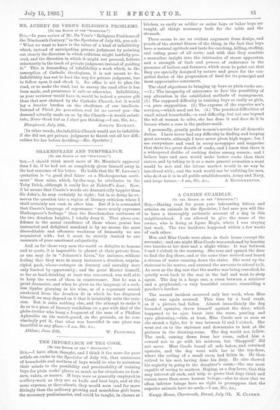SHAKESPEARE AND TEMPERANCE. [To THE EDITOR ON THE "SPECTATOR. "] should
think much more of Mr. Maurice's approval than I do, if he had not so completely given himself away in the last sentence of his letter, He holds that Sir W. Lawson's quotation is "a good deal fairer as a Shakespearian senti- ment" than mine, which, by-the-way, he attributes to Sir Toby Belch, although it really lies at Falstaff's door. Now, if he means that Cassio's words are dramatically happier than Sir John's, he may certainly be right; but in so doing he re- moves the question into a region of literary criticism where I shall certainly not rush in after him. But if it is contended that Cassio's language of repentance " more nearly expresses Shakespeare's feelings " than the Bacchanalian outbursts of the two drunken knights, I totally deny it. That pious con- fidence in the moral excellence of those whose genius has instructed and delighted mankind is by no means the most discreditable and offensive weakness of humanity we are acquainted with ; but it must be strictly limited to our moments of pure emotional subjectivity.
And as for those very men the world so delights to honour and to quote, it is impossible to glance at their private lives, as one may do in Johnson's Lives," for instance, without feeling that they were in many instances a drunken, unprin- cipled pack, whose• outrages on decency and morality were only limited by opportunity ; and the great Master himself, so far as hard-drinking at least was concerned, was well able to keep the worst of them in countenance. But be was a great dramatist, and when be gives us the language of a reck- less tippler glorying in his wine, or of a repentant wretch awakened from the drunken fit in which he has disgraced himself, we may depend on it that it inimitably suits the occa- sion. But it suits nothing else, and the attempt to make it do so is a piece of literary vandalism on a par with that of the globe-trotter who hung a fragment of the nose of a Phidian Aphrodite on his watch-guard, on the grounds, as he con- vincingly put it, that what was beautiful in one place was beautiful in any place.—I am, Sir, ,Sze., Athlone, Tune 10th. W. FLETCHER.


































 Previous page
Previous page